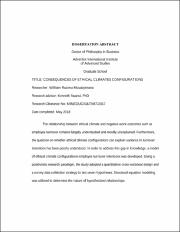| dc.description.abstract | The relationship between ethical climate and negative work outcomes such as employee turnover remains largely understudied and mostly unexplained. Furthermore, the question on whether ethical climate configurations can explain variance in turnover intentions has been poorly understood. In order to address this gap in knowledge, a model of ethical climate configurations-employee turnover intentions was developed. Using a positivistic research paradigm, the study adopted a quantitative cross-sectional design and a survey data collection strategy to test seven hypotheses. Structural equation modeling was utilized to determine the nature of hypothesized relationships.
The structured model was specified with six fit indices: chi-square value /degree of freedom = 1.958, GFI = 0.920, incremental fit index = 0.940, Tucker-Lewis Index = 0.924, comparative fit index = 0.939, and root mean square error of approximation = 0.057. This model explained 33% of the variance in employee turnover intentions. The results showed a direct negative influence of organizational commitment ( = -0.302, p < .001) on employee turnover intention. In like manner, the effect of organizational trust ( = -0.369, p < .001) on employee turnover intention—direct and indirect through organizational commitment—was negative and significant. The results also revealed that benevolent and egoistic climates had rival effects on organizational commitment and organizational trust. However, no significant relationship was identified between job satisfaction and employee turnover intention.
The findings if this study contribute to the literature of consequences of ethical climate in three important ways: (a) understanding the mediating role of organizational commitment—between two antagonist ethical climate configurations and employee turnover intentions and between organizational trust and employee turnover intention—provides an insight to the importance of organizational commitment in the studies of employee turnover intentions, (b) the identification of a direct positive significant influence of principled climate on employee turnover intentions reveals that utilizing the promotion of independence climate for enhancing employee retention should be used with caution, and (c) understanding the relationships between ethical climate configurations, organizational trust, and organizational commitment provides insight to
the importance of organizational trust in the organization. Implications for further research and some implications for practice were discussed in this study as well. | en_US |

